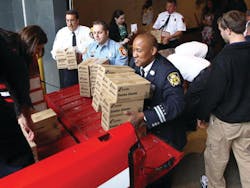Ten years ago, Brendan Shanahan -- then one of the stars for the NHL's Detroit Red Wings -- approached the team's front office wanting to do something to remember his father, who was a firefighter, after he passed away
The team's smoke alarm initiative began, and since then it has helped distribute close to 20,000 of the devices to departments throughout southeastern Michigan.
This year, 5,065 alarms were collected -- the most ever during the program's history and almost double the amount collected last year.
In all, eight departments were on hand at an event at Joe Louis Arena on Wednesday to receive the smoke alarms.
The largest department -- the City of Detroit -- was given 1,000 devices, while Flint and Saginaw were given 750 each.
The rest of the smoke alarms were distributed to the other departments in attendance and will be further distributed to more, and then installed in households in high-risk and low-income communities.
"Some of them are smaller cities, but in that case, one will pick them up and share with the others," Red Wings Community Relations Manager Christy Hammond said.
One example of a small department that will further distribute the devices is the City of Roseville, which was given 500 smoke alarms and will bring them to departments throughout Macomb County.
This year, there were three collection events in which fans were encouraged to either bring a new smoke alarm or a cash donation.
At the first event, Red Wings player Henrik Zetterberg signed autographs in exchange for the donations.
Fans could donate $20 or two smoke alarms for a signed puck or another small item, or $40 or four smoke alarms for a jersey or another large item.
Two in-game collections also were held during two preseason games.
Aside from signing autographs and attending the distribution event on Wednesday, Zetterberg also matched the total dollar amount of the donations, with each smoke alarm being counted as $5.
The eight-year veteran with the Red Wings -- the team that drafted him -- donated more than $10,000, which went toward purchasing more smoke alarms.
Overhead costs for the hockey team have always been minimal, Hammond said, but this year Comerica Bank signed on as a sponsor for two years and all of the costs incurred have been covered.
Hammond, who organizes various community events for the team throughout the year, said the uniqueness of the smoke alarm program and its goal really make it worthwhile.
"I really enjoy this event," she said. "Seeing all of the fire departments from the area, putting the pallets of smoke detectors in their vehicles and getting autographs and talking to Zetterberg."
She said that while she has a hand in organizing the event, a lot of the credit should go to Southfield Fire Inspector Michael Albo, who has helped with the event for close to six years.
"He is truly the person who goes out to each fire department and gets them involved," she said. "We do the leg work for promoting it, but he's really the one that goes out and gets the departments involved."
Albo said that he first learned about the program from a friend.
"We jumped on board and have been doing it ever since," he said.
He said the program has proved to be very successful in the Detroit area and that he would like to see other NHL franchises mirror what the Red Wings are doing.
"What I like about it, is that these pro athletes are giving back to the community in these big-city sports towns," he said. "I don't see why this couldn't be done by other teams. It would be nice to see this going on all over the country."
He said that having the Red Wings involved has a tremendous impact.
"We don't have the budget for this," he said. "Every smoke alarm, as far back as I can remember, has been donated."
He said that while local businesses and national chains such as Lowes and Home Depot donate smoke alarms to local departments, getting the backing of a professional sports franchise really enhances what can be done.
"Without the Wings we'd never be able to do this to this magnitude," he said. "When you get some big names in it, you'll get more attention. At the local level we could never get this exposure."
He said that small-town departments could look to partner up with local minor-league teams or colleges to develop similar programs.
"Even if it's only 20 smoke alarms, that's 20 more you wouldn't have without it."
The 15-year fire service veteran, who has served in a fire prevention capacity for the last seven years, said that he always had his sights set on prevention from the start and feels that it really does make a difference.
"At the end of the day, if we can reduce the number of residential fires, it's a win-win," he said. "If we can reduce the number of times our guys go to these calls, we can reduce the number of firefighter deaths.
"It's not only saving the citizens' lives, but our lives too."
About the Author
Paul Peluso
Staff Writer
Paul Peluso is a Firehouse.com staff writer and has worked for the Web site since 2006. Previously, he worked as a reporter for several community newspapers located in the suburbs of Baltimore, Md. Since joining the newsteam, Paul has covered various fire service issues including fire sprinklers, grants, line of duty deaths and technology. While he started out at the Beltsville, Md. office, he has since moved to Florida where he works out of his home office in Tampa.

